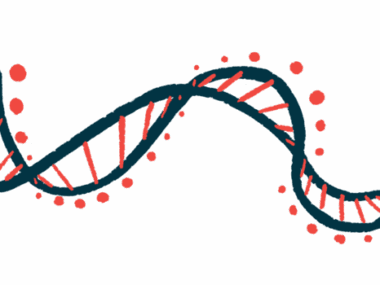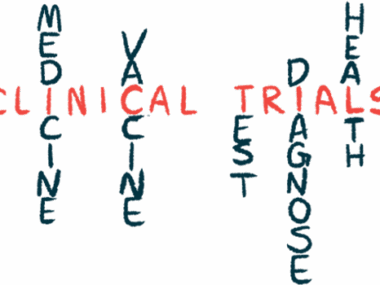High-dose efzofitimod cuts relapse rate following steroid taper
Therapy also improved lung function, patient-reported quality of life
Written by |

Higher doses of the investigational therapy efzofitimod significantly reduced relapse rates after a dose of a corticosteroid was reduced in people with pulmonary sarcoidosis, according to a new, pooled analysis of Phase 1b/2a trial data.
The first-in-class immunomodulatory therapy, developed by aTyr Pharma, also significantly improved lung function and patient-reported quality of life in the pooled high-dose groups compared with the pooled low-dose and placebo groups.
“This is one of the few studies to demonstrate a steroid sparing effect of a drug associated with a significant improvement in patient outcome,” Robert P. Baughman, MD, professor of medicine at the University of Cincinnati Medical Center, Ohio, said in an aTyr press release. “A treatment such as efzofitimod that can reduce steroid burden is greatly needed.”
The results of this latest analysis were presented this month in the poster “Therapeutic doses of efzofitimod significantly improve multiple pulmonary sarcoidosis efficacy measures” at the European Respiratory Society (ERS) International Congress 2023, in Italy.
In sarcoidosis, abnormal clumps of immune cells called granulomas form in tissues, causing inflammation and damage. In about 90% of cases, the granulomas form in the lungs — called pulmonary sarcoidosis — which can lead to scarring and make breathing difficult.
Challenges, side effects of corticosteroids in sarcoidosis care
Corticosteroids that help control and reduce inflammation are commonly prescribed as a first-line treatment for pulmonary sarcoidosis. Long-term steroid use is associated with considerable side effects, however.
“Oral corticosteroids remain the mainstay of treatment for patients with pulmonary sarcoidosis, although long-term treatment often comes with severe side effects and toxicity,” Baughman said. “Steroid tapers in these patients are challenging, as symptoms and [lung function] can worsen when steroid dose is reduced.”
Formerly called ATYR1923, efzofitimod is designed to resolve inflammation and possibly prevent tissue scarring by modulating the activity of NRP2, a protein at the surface of immune cells that plays a role in granuloma formation and lung inflammation.
The completed Phase 1b/2a trial (NCT03824392) evaluated the safety, tolerability, pharmacologic properties, and preliminary effectiveness of three doses of efzofitimod (1, 3, and 5 mg/kg) versus a placebo in 37 pulmonary sarcoidosis patients for at least six months.
The therapy and placebo were each administered through an into-the-vein infusion once every four weeks. Participants also received 10 mg or more of oral corticosteroids a day, which was tapered in the study’s first eight weeks.
Efzofitimod eased symptoms, improved lung function, and reduced the need for corticosteroids, top-line data showed. A more recent analysis, combined with pharmacological findings from a previous trial in healthy volunteers, suggested greater efzofitimod exposure was linked to more pronounced benefits.
In the latest post-hoc analysis, that is, one conducted after all data were collected, researchers pooled the results based on pharmacological data that let researchers predict which efzofitimod doses would be therapeutic.
High dose of efzofitimod vs. low dose
Data from the 17 patients who received the highest, therapeutic doses (3, 5 mg/kg) were pooled (therapeutic group) and compared with outcomes from the 20 patients who received the lower, sub-therapeutic dose (1 mg/kg) or a placebo (subtherapeutic group).
Demographic and clinical features were generally comparable between the therapeutic and subtherapeutic groups. Still, pooled analyses were adjusted for these features to ensure appropriate comparisons, the researchers noted in the abstract.
Significantly fewer patients in the therapeutic group relapsed after the steroid was tapered compared with those in subtherapeutic group (7.7% vs. 54.4%). Relapses were defined as a sarcoidosis-related increase in oral corticosteroid dose after being tapered to 5.0 mg or less for at least five consecutive days.
“This analysis demonstrating a relapse rate limited to 7.7% for the efzofitimod therapeutic group is exciting, as we would normally expect to see a relapse rate as high as approximately 50% over the course of [six] months, which is what was observed in the subtherapeutic group,” Baughman said. “The difference may even be more evident in a longer study.”
Lung function, as assessed with forced vital capacity (FVC), was significantly improved in the therapeutic versus the subtherapeutic group, who showed a decline trend in lung function over time.
Significantly more patients in the therapeutic group reported an increase of 12 points or more — three times the minimal clinically importance difference — in the Kings Sarcoidosis Questionnaire-Lung than those in the subtherapeutic group (52.9% vs. 15%). This patient-reported, quality of life measure assesses the frequency of lung symptoms, with higher scores indicating better health.
Patients given the high doses were also significantly more likely to achieve a response, defined as corticosteroid reduction, stable lung function, and stable or improved patient-reported outcomes (64.7% vs. 20%).
This analysis demonstrating a relapse rate limited to 7.7% for the efzofitimod therapeutic group is exciting, as we would normally expect to see a relapse rate as high as approximately 50% over the course of [six] months, which is what was observed in the subtherapeutic group.
“This new data from a post-hoc analysis … is yet another indicator of the robust efficacy demonstrated in this study,” said Sanjay S. Shukla, MD, president and CEO of aTyr. “The statistically significant difference in the relapse rate following steroid taper seen in the two highest efzofitimod dose groups, combined with significantly improved FVC and quality of life measures, suggests that efzofitimod has the potential to be the first steroid-sparing and disease-modifying treatment for sarcoidosis.”
“These findings provide further evidence of efficacy for efzofitimod and help inform potential criteria for a responder endpoint in pulmonary sarcoidosis,” the researchers wrote in the poster.
An aTyr-sponsored Phase 3 trial, dubbed EFZO-FIT (NCT05415137), is testing the two high doses of efzofitimod (3, 5 mg/kg) against a placebo in up to 264 adults with pulmonary sarcoidosis.
The study is enrolling participants at sites in the U.S., Europe, and Japan, and is expected to wrap up in January 2025. Its main goal is to assess efzofitimod’s impact on corticosteroid dose reduction after about a year. Secondary measures include changes in lung function and sarcoidosis symptoms.






